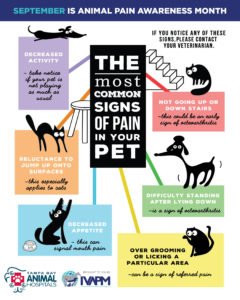Common Signs of Pain in Cats

What if you couldn’t tell your doctor that you were in pain? Animals suffer from pain just like we do. Pain comes in many forms: surgical pain, arthritis and cancer, just to name a few. Acute pain is obvious and distressing. Chronic pain can be subtle, and masked as “getting old” or “slowing down.” Age is not a disease, but pain is. There are many options to treat the various causes of pain in animals including pain medications, physical rehabilitation and acupuncture and laser therapy.
Unfortunately, our cats can’t just tell us when they hurt. Of course, there’s no doubt when it’s dinner time, right? But the truth is, cats—they’re masters at hiding pain. If you don’t pay attention to the little clues that indicate your cat is hurting, you may miss when they need your help.
The obscure cat
Cats are good at hiding their pain. So, if you notice your cat acting grouchy, flattening his ears back, really crouching up his body position, or—especially—hiding, it may be a good indication that your pet is experiencing pain.
Common Signs of Pain in Cats
- Reduced activity
- Aggressive behavior when touched
- Loss of appetite
- Quiet/loss of curiosity
- Changes in urinary/defecation habits
- Hiding
- Hissing or spitting
- Lack of agility/jumping
- Excessive licking/grooming
- Stiff posture/gait
- Guarding behavior
- Stops grooming/matted fur
- Tail flicking
- Weight loss
If your pet has ANY changes in behavior, it warrants an examination by a veterinarian. Pain medications are very safe and effective and can help your pet get back to normal behavior. Of course, looking for the source of a patients pain or discomfort will need be addressed. Arthritis and joint pain, dental pain, ear pain, organ disorders, bladder infections, and skin disorders can all be sources of pain or discomfort for your pet.
If you feel like your pet might be in pain or is not acting normal, please contact us for a check up.
Courtesy of IVAPM- Behavior (12)
- Caring for your pet (266)
- cat (6)
- Community Events (19)
- dog (7)
- From Our Clients (15)
- Happy Tails (9)
- News (424)
- Press (53)
- Products (2)
- Questions (4)
- Recalls (1)
- Special Offers (5)
- Tips & Advice (231)
- Uncategorized (19)
- Veterinary Services (48)

